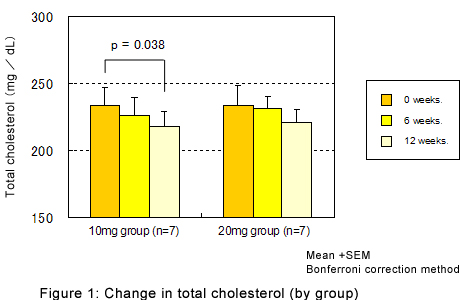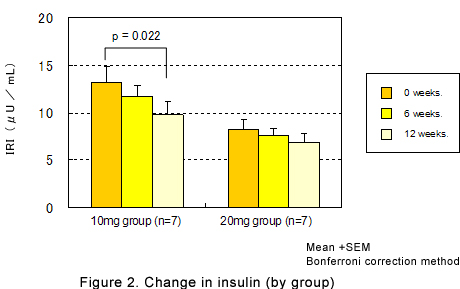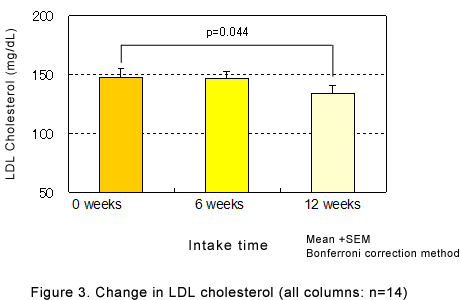Color Trading Sp. z o. o.
- English
Please select your Region.
Please select your Region.
May 22, 2012
ARKRAY, Inc. has announced the effects of supplements containing auraptene1 found in Citrus hassaku on people with pre-metabolic syndrome (Auraptene 10mg/ day) at the 66th Annual Meeting of the Japanese Society of Nutrition and Food Science2 held in Sendai. This is the world’s first announcement regarding human clinical food trials of auraptene.
Since the results of previous lab testing and animal trials, the anti-metabolic syndrome effect from food materials containing auraptene has been widely expected. This research shows that the intake of two supplements 10mg/ day and 20mg/ day of auraptene, developed by ARKRAY and provisionally named ’Hassaku Oil Extract’ served to reduce LDL cholesterol3, total cholesterol and insulin significantly in the blood of 14 people with pre-metabolic syndrome. Results indicate that Hassaku Oil Extract at auraptene 10mg/ day is effective in preventing and slowing the progression of metabolic syndrome and arteriosclerosis. Details of the announcement are the results of joint development with Dr. Masamichi Yano from The Council for Advancement of Fruit Tree Science and Prof. Teruo Kawada from Kyoto University Graduate School of Agriculture.
Hassaku Oil Extract is the 4th function food material developed by ARKRAY.
ARKRAY continues to work toward contributing to the healthy lives of all people through the development and distribution of functional food materials

*<Details of research> <Explanation of terminology> can be found attached.
*About ARKRAY
ARKRAY is a manufacturer of sample test devices and reagents and holds a large share as market leader of self monitoring of blood glucose meters used by diabetics in Japan. As part of its commitment to contribute to the healthy lives of people all over the world, ARKRAY develops products for patient care and to contribute to disease prevention.
Product outline
ARKRAY has been involved with function food materials since June 2006 and has been progressing with research into the functional constituents within citrus fruit. ARKRAY has already made announcements regarding the properties and mechanisms within substances found in shiikuwasa and satsuma. Products with high concentrations of functional substances are on sale, in the case of biletin from shiikuwasa or preparing to go on sale, as with cryto-beta from satsuma. Hassaku Oil Extract is the 3rd functional food from ARKRAY that comes from citrus fruit. Auraptene from hassaku, a fruit well known in Japan, has been the target of laboratory and animal testing and the development of this food material.
| ■Some previous academic conference announcements regarding auraptene■ | |
|---|---|
Conference (year & month) | Details of announcements |
27th annual meeting of the | Entitled ’Discussion as to increased sugar/ fat metabolism via PPARs from auraptene found in citrus fruit’, this research indicates that auraptene found primarily in citrus fruit is particularly effective in dual agonist screening for the simultaneous activation of PPARα5 and PPARγ5. In assays using human liver cell HepG2 and cultured preadipocyte 3T3-L1, auraptene, as a dual agonist of PPARα and PPARγ, may improve the metabolism of fat in the liver as well as lipocyte function. |
30th annual meeting of the | 1. Entitled ’Improved sugar/ lipid metabolism from auraptene uptake in model mice with diabetes/ obesity’, this research shows that auraptene intake in model mice is associated with improved insulin resistance, decreased lipocyte weight and anti-obesity effects as well as a reduction of central fat in the liver and an increase in genetic expression for fatty acid oxidation, a target for PPARα. 2. Entitled ’The effect from auraptene on inflammatory reactions in fatty tissue associated with obesity’ this research shows that when observing the anti-inflammatory effects of auraptene using lipocytes in combination with macrophages in vitro, increases in inflammatory adipo-cytokine MCP-1 and TNF-α secretion volumes are inhibited to a significant extent by the addition of auraptene. |
ARKRAY has moved from the discussion phase to verifying the mechanism of auraptene in Citrus hassaku in preventing metabolic syndrome and has shown its effectiveness.
The company now plans to contribute to people’s health through the functional food material ’Hassaku Oil Extract’ (provisional name) and to spread information about its effectiveness.
The effect of auraptene from Citrus hassaku on people with pre-metabolic syndrome
Hiroshige Kawai 1), Takao Sasaki 1), Masamichi Yano 2), Teruo Kawada 3)
1) ARKRAY, Inc.; KARADA Lab, Inc.
2) The Council for Advancement of Fruit Tree Science
3) Kyoto University Graduate School of Agriculture Division of Food Science and Biotechnology Laboratory of Molecular Function of Food
Method
Test subjects: 14 males aged 40-64 with pre-metabolic syndrome.
Test material: soft capsules containing preparation with extract of Citrus hassaku oil 3 capsules/ day
Intake volume: Auraptene 10, 20 mg/ day (2 dosage level test subject groups)
Intake time: 12 hours
Time of testing: before intake, at 6 hours, at 12 hours
Test details: medical examination, physical exam, blood tests & urine tests etc.
Results
1. The group with an intake of 10mg/day showed significant reductions in total cholesterol (Figure1), Insulin (Figure 2) and HOMA-IR.
2. When the groups with intakes of 10mg and 20mg/day were combined, significant reductions in LDL cholesterol (Figure 3), total cholesterol, insulin and HOMA-IR were observed.
3. There was no significant difference in insulin or HOMA-IR in the group with an intake of 20mg/day. One factor behind this is thought to be group-to-group differences between the 10mg/dL and 20mg/dL groups at baseline.



In conclusion
We can infer that Citrus hassaku oil extract, as a major source of auraptene, is useful in preventing the progression of metabolic syndrome and arteriosclerotic disease.
Explanation of terminology
1) Auraptene
Auraptene is a type of coumalin found in abundance in the skin of citrus fruits such as Watson pomelo, hassaku, grapefruit etc. While not water soluble, it is soluble in lipids.
From recent cell research, animal trials and other discussions, it is known to have anti-metabolic syndrome, cancer prevention, anti-inflammatory and anti-pylori properties.
2) Japan Society of Nutrition and Food Science
The Japan Society of Nutrition and Food Science is a group founded on 2 May 1947 that aims to promote nutrition and food science through announcements as well as the exchange and supply of information to boost scientific learning and to contribute to the health of people in Japan.
3) LDL Cholesterol
LDL- cholesterol is a type of cholesterol enclosed in low density lipo-protein (LDL) which is known to transport cholesterol formed in the liver to peripheral tissue.
As its concentration in blood increases, it builds up on the inner walls of blood vessels and is a risk factor in the progression of arteriosclerosis. For this reason, it is also known as bad cholesterol.
The standard range for LDL-cholesterol is 65-139mg/dL, while the standard range in post-menopausal women is 70-159mg/dL.
4) Japan Society for the Study of Obesity
Originally founded in 1980 as an obesity research group, it now consists of 2600 members (as of 2012) working toward basic and clinical research into pathological obesity through its definition as opposed to simple obesity.
5) PPARα and PPARγ
PPAR stands for Peroxisome Proliferation-Activated Receptor and is a ligand-dependent transcription factor that belongs to the nuclear receptor superfamily. PPARα is found in abundance in the liver, kidneys, heart, skeletal muscle and brown adipose cell tissue, and because it activates the metabolism of lipids, it is a target for fibrate base drugs used in the treatment of lipid metabolism disorders. PPARγ is found specifically in fat cells, and because it is closely related to the production of adiponectin and adipocyte differentiation, it is the target of thiazoline drugs used for the improvement of insulin resistance.
![]()